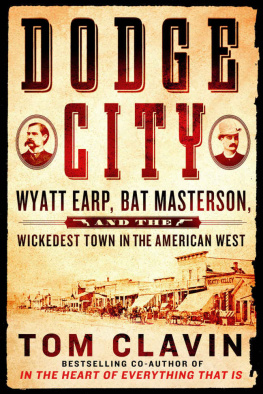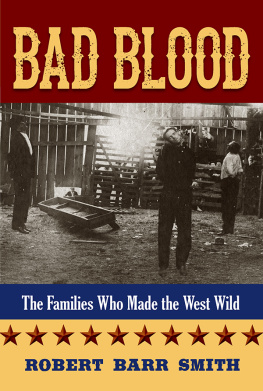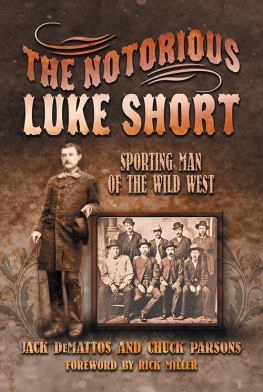2017 by the University Press of Kansas
All rights reserved
Published by the University Press of Kansas (Lawrence, Kansas 66045), which was organized by the Kansas Board of Regents and is operated and funded by Emporia State University, Fort Hays State University, Kansas State University, Pittsburg State University, the University of Kansas, and Wichita State University.
Library of Congress Cataloging-in-Publication Data
Names: Dykstra, Robert R., 1930author. | Manfra, Jo Ann, author.
Title: Dodge City and the birth of the wild west / Robert R. Dykstra and Jo Ann Manfra.
Description: Lawrence, Kansas : University Press of Kansas, 2017. | Includes bibliographical references and index.
Identifiers: LCCN 2017020136
ISBN 9780700624751 (cloth : alk. paper)
ISBN 9780700624768 (pbk. : alk. paper)
ISBN 9780700624775 (ebook)
Subjects: LCSH: Dodge City (Kan.)History19th century. | Frontier and pioneer lifeKansasDodge City. | ViolenceKansasDodge CityHistory19th century.
Classification: LCC F689.D64 D95 2017 | DDC 978.1/76dc23
LC record available at https://lccn.loc.gov/2017020136.
British Library Cataloguing-in-Publication Data is available.
Printed in the United States of America
10 9 8 7 6 5 4 3 2 1
The paper used in this publication is recycled and contains 30 percent postconsumer waste. It is acid free and meets the minimum requirements of the American National Standard for Permanence of Paper for Printed Library Materials Z39.48-1992.
INTRODUCTION: GETTIN OUTTA DODGE
Dodge Citys very first gunfight, so far as anyone knows, occurred in the wee hours of September 3, 1872. A fragmentary news report out of nearby Hutchison verifies the encounter.
SHOOTING AFFAIR AT DODGE.We learn from persons who came down the road yesterday, that there was a lively shooting affray at Dodge on Tuesday, in which four or five persons were wounded, one or two perhaps fatally. We did not learn the names of any of the parties concerned.
Decades later a pioneer named George Brown, once the co-owner of one of the low-end saloons that hugged the riverbank in early Dodge, found himself recalling all the names and details. It started, he said, with the harassment of gambler Charley Morehouse by John Langford and two of Langfords pals. They pulled Morehouse out of bed one night, where he was enjoyin himself with a dance-hall girl, and made him drink with them, Brown remembered. Intent on payback, later that night as drinkers crowded the makeshift bar,
Morehouse and his bunch came into my saloon and inquired for Johnnie Langford. I told them he had just left about two minutes ago. They stepped to the front door and [spotted Langford and friends] going down the street. The Morehouse party opened fire on them. Langford returned the fire and bullets were flyin around pretty thick.
Brown wryly itemized the fallout.
One man was shot in the heel as he was goin out the back door. A man was on a cot near the door on the outside. Next morning they found five bullet holes through his coat, and the man wasnt touched. In all this shootin there wasnt a man killed.
Morehouse suffered only an inconsequential wound in the arm and remained a regular in Dodge City saloon life until almost the end of the year. Not so his antagonist.
Langford was shot five times, but he crawled off and hid himself in some brush down near the river. He was rescued next morning and was taken to the hospital at Fort Dodge.
Offloaded at the fort after a five-mile wagon ride from Dodge City, the dirt- and blood-encrusted Langford might just have got lucky. Dr. William Tremaine, the posts Canadian-born physician, happened to be a pioneering American student of the Lister system, the surgical reforms urged by the prominent Scots physician Joseph Lister. Calling for operating-room cleanliness and strict antiseptic surgical procedures, Listers innovations failed to take hold in the United States until the 1890s. In 1882 the American Surgical Association declared them unproven at best, nonsense at worst. Hence most surgeons ignored filthy hospital conditions, failed to sterilize their instruments, and even neglected to scrub their hands before operating. Not so Dr. Tremaine, who had trained himself in the dangers of unclean equipment, dirty hospital bedding, and soil in open wounds.
Due for leave in September 1872, Tremaine may still have been on post when Langford was brought in on the third of that month. If so, he would have directed an assistant to continuously spray the patients wounds with an antiseptic carbolic acid solution, while he himself removed pistol slugs, dead tissue, and microbe-laden soil. Afterward Langford lay in the post infirmary for quite a while, remembered George Brown, and finally recovered.
John Langfords name then disappears from the record. When he painfully dragged his bleeding carcass into the undergrowth he desperately feared being hunted down by Morehouse and finished off. At the military hospital, once it became clear he would recover, one can imagine a friend of Langfords stopping by to warn him that Morehouse was still around town and to give him some good advice:
Johnnie, you better get outta Dodge.
That colorful figure of speech, however conjectural in Langfords case, is still with us. Just as Rome wasnt built in a day, its foolish to carry coals to Newcastle, so-and-so has been sent to Coventry or gone Hollywood, and something wont play in Peoria, so get out of Dodge is one of the rare place-name aphorisms in use among English speakers worldwide.
The Dodge City metaphor, with its echo of the Old West, dates from the Vietnam War. For young service personnel nurtured on television series featuring Dodge CityGunsmoke, Bat Masterson, The Life and Legend of Wyatt Earpthe phrase advised or described a hasty escape from some fearsomely defended enemy area or, as it came to be used, from any disagreeable situation. It remained popular among military professionals through the post-Vietnam decades.
By then it had infiltrated American popular speech, movies, magazines, newspapers, and books. For instance, in tracking the appearance of words or phrases year by year in millions of publications, Googles Ngram Viewer shows get out of Dodge on a steady climb from 1985 to 2008. And between 1979 and 2008 one metropolitan newspaper, the Boston Globe, cited metaphorical Dodge City, in one context or another, sixty-nine times. As recently as 2013 members of the New York City Preppers Network, readying themselves for the citys next natural disaster, employed as one of their mantras GOOD (Get Out of Dodge).












